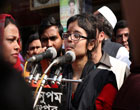Moni overcome Challenges to get Justice
Masuda Akter Moni’s story provides insight into a scenario that is very common in Bangladesh. A boy likes a girl, makes unwanted romantic advances, she refuses and he decides to punish her for exercising her right to say “no”. The girl’s life is completely shattered whereas the boy goes back to living his life and society turns a blind eye to the atrocity that he has committed. Moni was a student of class IX of Shamaj Kallyan Bidyabithi School and College in Rangpur. Moni was an extrovert by nature engaging in many extracurricular activities including art, dance, and music. When she was approached by a local youth who expressed his desire to marry her, Moni refused his marriage proposal. On August 13th, 2012, the youth along with three accomplices held Moni down in front of her house and poured acid on her face. Moni suffered severe burn injuries on her face, eyes, right hand, chest and backside. Moni was first taken to Dhaka Medical College Hospital where she received treatment for her burns but both her eyes were severely damaged and her eyesight began to deteriorate. She was brought to ASF hospital where she received further treatment along with psychological assessment and counseling for the trauma. When Moni first came to ASF she seemed withdrawn and showed signs of depression and anxiety for which she received continuous counseling and therapy. At the ASF hospital she was also surrounded by women including a peer counselor and hospital support staff of whom some are survivors of acid violence themselves. This kind of support from women who have had similar experiences give victims like Moni courage and strength to recover from the tragedy and readjust to their new life. Unfortunately Moni suffered severe damage to both her eyes leading to further complications and compromising her vision. ASF referred her to Islamia Eye Hospital in Dhaka were she received four surgeries however due to the complicated nature of her injury she has yet to regain her vision. When a young girl’s right has been violated in such a horrific way it can be expected that the perpetrator will immediately be caught and punished, and for community members to fight for the victim’s right to justice. In Moni’s case while she was receiving treatment in Dhaka her perpetrator had not been caught and he and his family continued to live in the same community as Moni. Some of her community members blamed Moni for being too social because of her interest in the performing arts which they felt attracted male attention. ASF took steps to inform the Acid Monitoring Cell under the Home Ministry, District Commissioner and Police Superintendent of Rangpur to arrest the perpetrators and take proper legal action. Mr. Shawkat Mostafa, Joint Secretary (Ministry of Home Affairs) and President of Acid Monitoring Cell instructed concerned authority to oversee the action for proper investigation. ASF also referred Moni’s case to its legal partner Brac to provide legal support. ASF also intervened at the community level by mobilizing community members, government officials, local elites, and journalists through community meetings and school campaigns to motivate and encourage community members to take action against these forms of crimes. As a result, the community put pressure on the perpetrator and his family which eventually led to the accused to sell their land and leave the community. Seeing the perpetrators not being held accountable for the crime that they have committed also delays a victim’s recovery from the trauma. The mental pressure of fighting long legal battles serves as constant reminder of the traumatic incident and prevents the victim from living a normal life. Moni is determined to bring her perpetrators to justice and is prepared to face the challenges that come with it. After 2 years and 8 months Moni has got justice. On 22 April, 2015 Acid Aporadh Damon Tribunal, Rangpur sentenced to death penalty against one perpetrator and two other to life imprisonment for throwing acid to her. This is an exemplary punishment against perpetrators.

